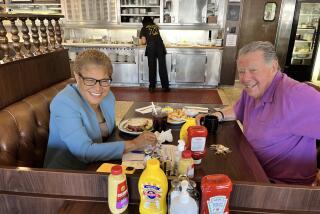Fast-food meddling
- Share via
Los Angeles City Council member Jan Perry wants to make sure that the people living in a 32-square-mile area of South Los Angeles don’t eat the wrong things. She put forward a motion barring new fast-food restaurants there for the next year, and, to the surprise of almost no one, it was approved Tuesday with little opposition.
Perry and her colleagues seem to believe that the only way to save people from themselves is to have government slap food from the hands of poor black and brown residents in her district. There is no disagreement that obesity and diabetes are a disproportionate problem in the South L.A. neighborhoods her moratorium targets. However, the culprit for this problem is not as clear as she and her allies would have us believe. The prevailing attitude at City Hall seems to be that government has an answer for all things. It does not, and government’s intrusions into the daily lives of citizens as well as constant meddling in the affairs of business often cause more harm than good.
There are many reasons to be troubled by the ban. Los Angeles is already perceived as a less-than-business-friendly city. Over-taxed and burdened by red tape, local businesses are the target of other states’ incentives and outreach programs. Disappearing Hollywood productions are a prime example.
Some argue that the moratorium simply mirrors zoning ordinances in more upscale parts of the city that have limited the proliferation of fast-food operations. Leaving aside the fact that such rules also infringe on the operations of free enterprise, Perry’s campaign doesn’t make this a featured argument. She is selling it, instead, as a way to improve the personal behavior of the residents in the targeted zone.
Her assumption is that the people in South L.A. are incapable of freely making good choices on their own. The finger-wagging inference is that poor black or Latino residents need government to limit their food options or else they’ll make themselves sick. What goes unacknowledged is the ability of fast-food chains to respond to consumers’ needs. In addition to standard burgers and fries, these businesses have already added healthier options to their menus, and now most offer salads, yogurt and fruit.
The real health problems in South L.A. are the result of long-standing food preferences influenced by culture, pocketbook imperatives and the dearth of supermarkets in the community that offer healthy, affordable produce. This means that solutions to diabetes and obesity are far more complex than Perry or her council accomplices are willing to admit.
To Perry’s credit, she has supported the opening of a new Fresh & Easy grocery store on East Adams Boulevard in South L.A., a nonunion expansion of Tesco, a British retail chain. (Predictably, union and community activists have done everything they could to prevent the store from opening.) As Perry points out, more investment of this kind is badly needed in poor areas of the city.
Perry ought to be able to see that the fast-food moratorium undermines that goal. It is not the role of government to intervene in the personal food choices of individuals, and it is not appropriate for city officials to manage what businesses can serve L.A.’s communities. Unlike the argument made against the proliferation of liquor stores some years ago, fast-food restaurants do not produce the kind of harmful side effects, such as crime and public drunkenness, that might justify City Council action.
There are far more pressing civic matters than keeping people away from French fries and cheeseburgers. Rather than obsessing about people’s food choices, Perry and her colleagues should concentrate on relieving the city’s budget crunch, wiping out gang violence, increasing the size of the police force and dealing with the paralyzing traffic we face each day.
The nanny state is defined as excessive government action to protect people from the consequences of their own actions by restricting their options. The slippery slope toward our own infantilization was considerably greased by the City Council’s vote on Perry’s moratorium.
More to Read
Sign up for Essential California
The most important California stories and recommendations in your inbox every morning.
You may occasionally receive promotional content from the Los Angeles Times.










